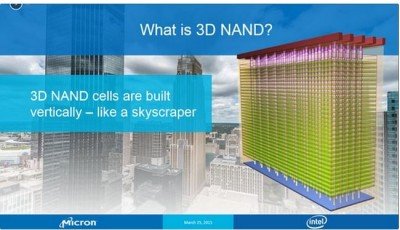Solid State Drives were thought of as a replacement for Hard disk drives but proved to be very costly compared to the latter and hence not many people wanted them. Eventually, Hybrid Drives were created that used a bit of SSD (Solid State Drives) on the regular Hard disk drives so that the time taken to fetch data is reduced.
Both Intel and Toshiba have been researching on the Solid State Drive technology and have come up with low cost SSDs. They say these devices will soon be available in all types of devices that need secondary storage. That would mean faster computing on anything from PCs to mobile phones as the chips are very small and do not take up much space.
Toshiba, based in Tokyo, has come up with what it calls a BiCS – a 2 bit per cell device. The storage contains 48 layers one above another just like the hard drives and the space between layers is almost non-existing, making it compact yet making it able to store up to 16 GB per SSD.
Intel too has come up with a technology similar to BiCS – 3D NAND – but has more storage to offer. It too places the 2 inch SSD layers on top of another and looks like a mini skyscraper. It is being said that the technology will provide up to three times of storage that the current SSD gates offer. That would mean up to 3.5 TB storage in one solid state disk drive. It employs floating gate cells to make it highest density flash device.
The difference between storage capacities of Toshiba and Intel is visible as the former has only 16 GB per plate. For a proper machine, it would need more circuits and parallel SSDs so that they can compete with Intel. But for mobile devices like phones and mini tablets, the design is perfect as it takes up just 2 inch of storage and is not bulky. The Intel chips can be used better on bigger tablets, laptops, convertibles and PCs.
However, the chips from both the companies are yet to be manufactured in bulk. Right now, it is being said that the hardware companies are testing demo computers built using the chips. The market will see computers with these SSDs by the end of year.

Leave a Reply